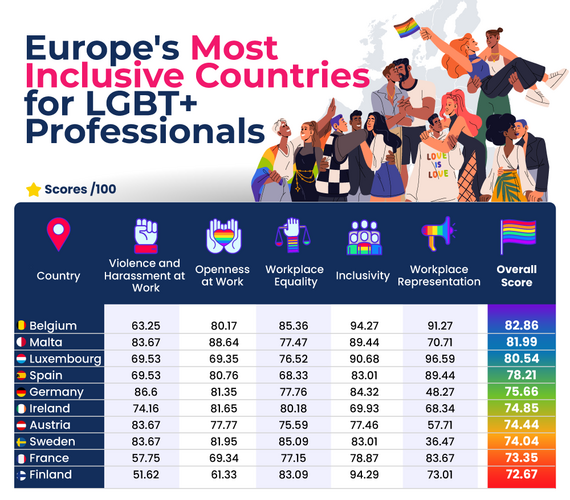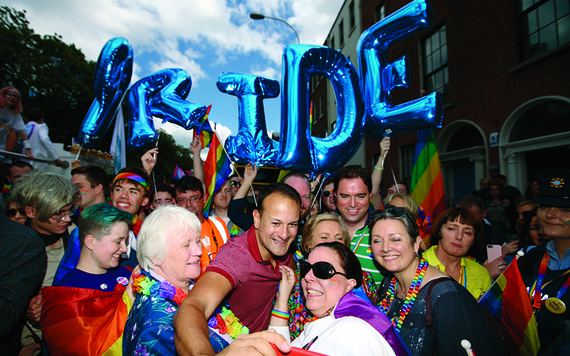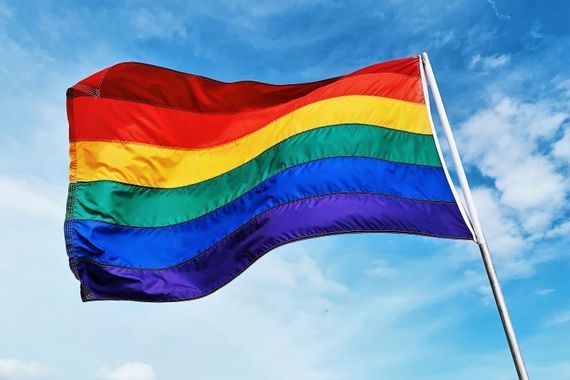A new study found that Ireland is one of the most inclusive countries in Europe for LGBTQ+ workers.
Around 76% of European citizens claim to support the LGBTQ+ community, showcasing a distinct rise in acceptance over recent years. This positive shift in public attitude has also led to many people being more open about their identities, especially in the workplace.
To determine which European countries provide the best opportunities for LGBTQ+ professionals, SEO agency Reboot Online analyzed more than 93,000 responses from the European Fundamental Rights Agency’s latest survey on workplace experiences - from openness to LGBTI at work to discrimination when job hunting. They combined this with Eurostat’s LGBT+ employment rate and Rainbow Europe’s data featuring workplace violence, equality, representation, and more to create an index-based ranking.
The Most Inclusive European Countries for LGBT+ Professionals 2025

Ireland takes sixth place with a score of 74.85 out of 100. It also ranks highly in workplace equality, with a score of 80.18 out of 100. Very few LGBTQ+ individuals in Ireland reported having experienced a negative attitude at work due to their identity, hence why the country ranks so highly.
In 2017, Ireland appointed its first openly gay Taoiseach, becoming the fourth openly gay head of state/government in the world.
Meanwhile, Belgium ranks as the most inclusive country in Europe for LGBTQ+ professionals, scoring 82.86 out of 100. A 2024 poll highlighted that 52% of the population supports the right for LGBTQ+ individuals to be open about their orientation and/or gender identity, whereas only 15% are opposed. This is the second year in a row in which Belgium has ranked first in Reboot Online’s study, cementing it as the most inclusive and accepting country for LGBTQ+ professionals.
In 2003, Belgium became the second country to legalise same-sex marriage and introduced anti-discrimination laws to protect its LGBTQ+ citizens. Hence, Belgium also has the highest inclusivity score, tied with Finland, at 94.27 out of 100.

Former Taoiseach Leo Varadkar at a Pride celebration in Dublin. RollingNews.ie
Malta ranks second with an overall score of 81.99 out of 10. Boasting one of the most progressive legal frameworks for LGBTQ+ rights, Malta has cemented itself as a highly queer-friendly country. Since last year's rankings, the country has risen to second from fifth place, showing extraordinary improvements and commitments to equality in the workplace.
In 2016, Malta became the first country in the European Union to ban conversion therapy, allowing its LGBTQ citizens to be out and proud. The country also ranks highest for ‘openness’ in the workplace, scoring an impressive 88.64 out of 100.
Luxembourg comes in third with an overall score of 80.54 out of 100, dipping one place from last year's ranking. It showcases one of the highest inclusivity scores, at 90.68 out of 100, meaning most companies in the country show a high level of acceptance.
Luxembourg ranks fifth in Europe for LGBTQ+ rights, with the country’s Prime Minister proudly stating that “being gay is not a choice, but being intolerant is a choice and I will stay intolerant to intolerance, and this will be today my fight”.
Spain ranks fourth, scoring 78.21 out of 100, climbing four places since last year. Following Belgium, Spain became the third European country to legalise same-sex marriage and adoption for same-sex couples in 2005. A recent poll found that 69% of people support LGBTQ+ rights in Spain, ranking it as one of the most accepting countries in Europe.
Spain also boasts a high openness at work score, 88.76 out of 100, showing that LGBTQ+ professionals are comfortable being open about their identity at the workplace.

Pride flag. Getty Images
Germany takes fifth place with an overall score of 75.66 out of 100, rising nine ranks since last year, one of the most impressive increases in workplace inclusivity. Often regarded as one of the safest countries for LGBTQ+ people in Europe, 57%5 of the LGBTQ+ population of Germany are fairly or very open about their identity.
LGBTQ+ professionals in Germany report very little workplace harassment/discrimination, scoring an impressive 86.60 out of 100, with the higher number indicating fewer incidents of harassment.




Comments